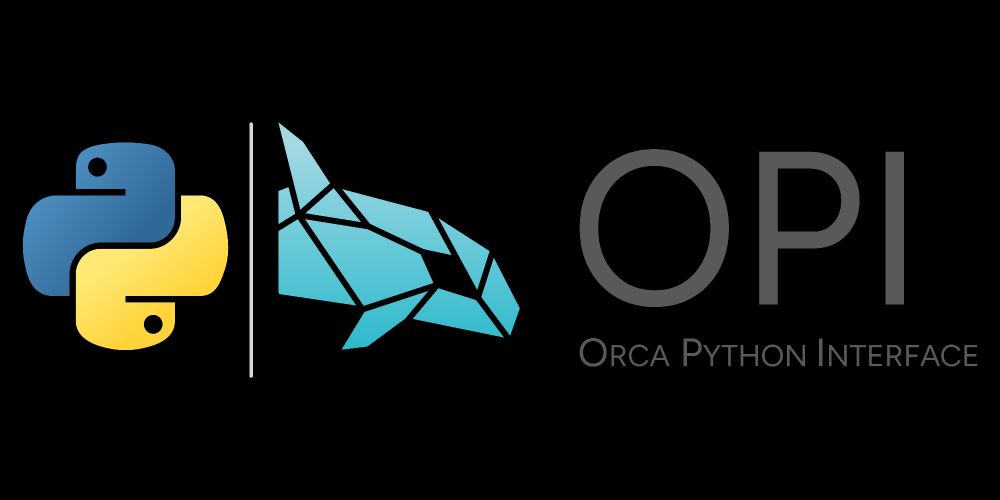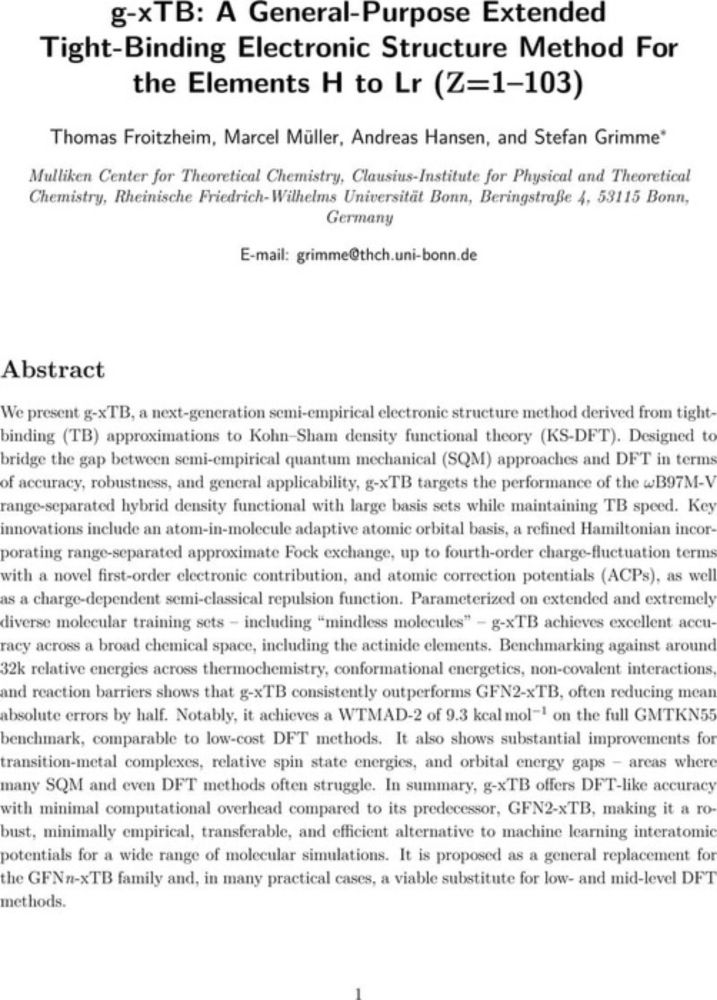
https://scholar.google.com.br/citations?user=U6szjgMAAAAJ&hl=pt-BR
Here's an ORCA developer and working at @faccts-orca.bsky.social to bring #compchem closer to industry. We're succeeding so far 🤓!
Main topics:
* New optim. algo.
* Speed up calcs.
* Huge scale QM
* Excited states
* ML-boost-to QC
👋🫡
www.faccts.de/weasel/
#FACCTs #Workflows #QuantumChem #CompChem #CADD
www.faccts.de/weasel/
#FACCTs #Workflows #QuantumChem #CompChem #CADD
www.faccts.de/docs/opi/nig...
OPI Docs: www.faccts.de/docs/opi/docs/
OPI GitHub: github.com/faccts/opi
#ORCAqc #ORCAPI #CompChem #Python #ChemSky

www.faccts.de/docs/opi/nig...
OPI Docs: www.faccts.de/docs/opi/docs/
OPI GitHub: github.com/faccts/opi
#ORCAqc #ORCAPI #CompChem #Python #ChemSky
Learn more about WEASEL www.faccts.de/weasel
#FACCTs #CompChem #QuantumChem #Fukui #Reactivity #WorkflowAutomation
Learn more about WEASEL www.faccts.de/weasel
#FACCTs #CompChem #QuantumChem #Fukui #Reactivity #WorkflowAutomation
One of WEASELs workflows is IM-CCS prediction which reliably predicts #IMCCS with a MARD of 1.7% (2.9 Å) for a set of 48 molecules.
Check out WEASEL at www.faccts.de/weasel.
#FACCTs #ChemSky #CompChem

WEASEL is our smart workflow driver that delivers efficient workflows for complex quantum chemical processes.
Learn more about WEASEL at www.faccts.de/weasel
youtu.be/stYgkMZwi5s
#WEASEL #FACCTs #CompChem #ChemSky

WEASEL is our smart workflow driver that delivers efficient workflows for complex quantum chemical processes.
Learn more about WEASEL at www.faccts.de/weasel
youtu.be/stYgkMZwi5s
#WEASEL #FACCTs #CompChem #ChemSky
1/3
arxiv.org/abs/2510.197...

1/3
arxiv.org/abs/2510.197...
- AutoOptimize Tool 🎉
- New charts and spectra
- Easier geometry constraints, including for ORCA input
- Plenty of bug fixes and tweaks
discuss.avogadro.cc/t/avogadro-1...
- AutoOptimize Tool 🎉
- New charts and spectra
- Easier geometry constraints, including for ORCA input
- Plenty of bug fixes and tweaks
discuss.avogadro.cc/t/avogadro-1...
#QBICVII #CompChemSky #ChemSky #ORCAqc #ORCA

#QBICVII #CompChemSky #ChemSky #ORCAqc #ORCA
GitHub: github.com/faccts/opi
Docs: www.faccts.de/docs/opi/1.0...
#ORCAqc #Python #FACCTs #CompChem #QuantumChem

GitHub: github.com/faccts/opi
Docs: www.faccts.de/docs/opi/1.0...
#ORCAqc #Python #FACCTs #CompChem #QuantumChem
doi.org/10.1021/acs....
#ORCA #ORCAqc #CompChem #QuantumChem #TheoChem #CASSCF

doi.org/10.1021/acs....
#ORCA #ORCAqc #CompChem #QuantumChem #TheoChem #CASSCF
doi.org/10.1021/jacs...
ORCA: www.faccts.de/orca/
#ORCAqc #ORCA #Catalysis #CompChem #QuantumChem

doi.org/10.1021/jacs...
ORCA: www.faccts.de/orca/
#ORCAqc #ORCA #Catalysis #CompChem #QuantumChem
The large total energy difference is explained trivially from a sum of the frag. contribution. 1/3
#compchem
The large total energy difference is explained trivially from a sum of the frag. contribution. 1/3
#compchem
doi.org/10.1039/D5CP...
www.faccts.de/docs/orca/6....
#ORCAqc #CompChem #QuantumChem #ChemSky #DFT

doi.org/10.1039/D5CP...
www.faccts.de/docs/orca/6....
#ORCAqc #CompChem #QuantumChem #ChemSky #DFT
These two structures have an RMSD of 0.45 Angs, but are **40 kcal/mol** apart in energy! I double checked, that's not a mistake, and the energy level was high.
Never underestimate!
#compchem
These two structures have an RMSD of 0.45 Angs, but are **40 kcal/mol** apart in energy! I double checked, that's not a mistake, and the energy level was high.
Never underestimate!
#compchem
If you find any problems, please report to the team, it is on everyone's best interest to find any bugs/issues and fix them. 🙏
www.faccts.de/docs/orca/6....
#ORCAqc #FACCTs #gxTB #CompChem #QuantumChem
If you find any problems, please report to the team, it is on everyone's best interest to find any bugs/issues and fix them. 🙏
Congratulations on the team, as @mrclmllr.bsky.social says, this is certainly a revolution.
g-xTB marks not just an evolution, but a revolution in the capabilities of semiempirical quantum chemistry. Convince yourself! A thread.
🔗 chemrxiv.org/engage/chemr...
#compchem

Congratulations on the team, as @mrclmllr.bsky.social says, this is certainly a revolution.
Tuesday, 18:30 - Deciphering Ligand Interactions with Biomolecules Using Quantum Mechanical Methods
Hope to see you there!
#FACCTs #WATOC2025 #CompChemSky #ChemSky #ORCAqc #ORCA61

Tuesday, 18:30 - Deciphering Ligand Interactions with Biomolecules Using Quantum Mechanical Methods
Hope to see you there!
#FACCTs #WATOC2025 #CompChemSky #ChemSky #ORCAqc #ORCA61
Please reach out if you want to chat, even if only to make a coffee pause 😉
#compchem
Please reach out if you want to chat, even if only to make a coffee pause 😉
#compchem
www.youtube.com/@faccts_orca
ORCA 6.1 Release Event Playlist:
www.youtube.com/watch?v=mRSk...
#ORCA61 #ORCAqc #FACCTs #MPIKOFO #CompChem #QuantumChem #ChemSky #CompChemSky

www.youtube.com/@faccts_orca
ORCA 6.1 Release Event Playlist:
www.youtube.com/watch?v=mRSk...
#ORCA61 #ORCAqc #FACCTs #MPIKOFO #CompChem #QuantumChem #ChemSky #CompChemSky
Here is the resulting ensemble of a GOAT conformational search using the UMA machine-learning model potential on a Pd-carbene metal complex.
Might be interesting for your research too @samblau.bsky.social
Here is the resulting ensemble of a GOAT conformational search using the UMA machine-learning model potential on a Pd-carbene metal complex.
Might be interesting for your research too @samblau.bsky.social
eu02web.zoom.us/j/6815327020...
Passcode: 297206 , if needed
#compchem

eu02web.zoom.us/j/6815327020...
Passcode: 297206 , if needed
#compchem




